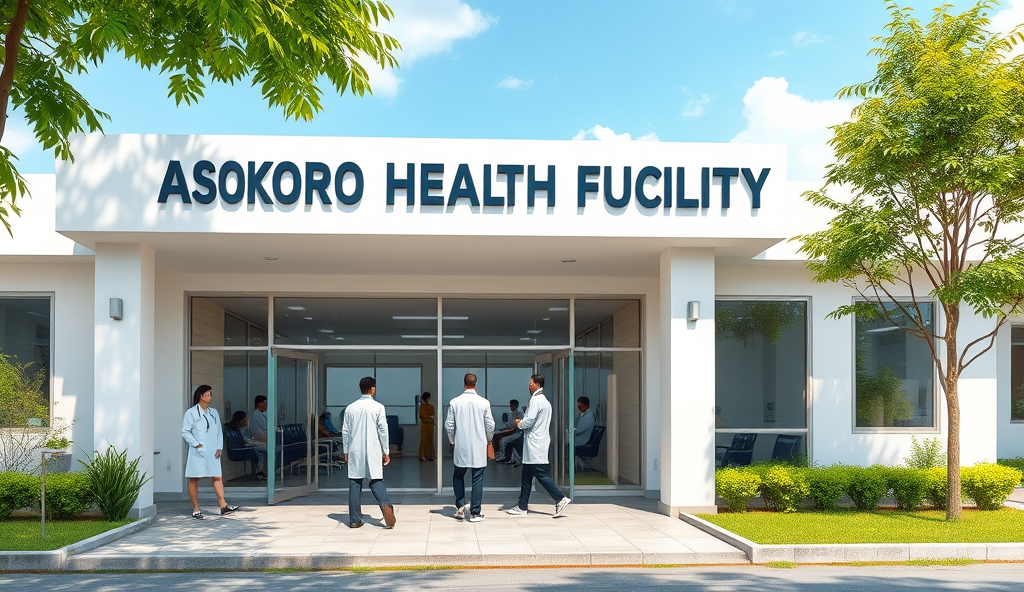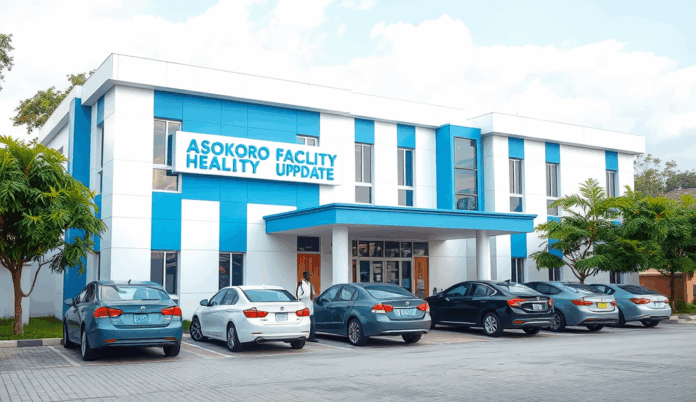Introduction to Asokoro Health Facility Updates in Nigeria
Asokoro’s healthcare landscape is undergoing significant transformations, with recent government and private sector investments driving modernization across its facilities. In 2023, the Federal Capital Territory Administration allocated ₦2.5 billion for upgrades to Asokoro General Hospital, focusing on infrastructure and equipment enhancements to meet growing patient demands.
These developments align with Nigeria’s broader healthcare agenda to improve accessibility and quality of services in urban centers.
Key updates include the installation of advanced diagnostic tools at Asokoro Medical Center, such as MRI and CT scanners, to reduce patient referrals to distant facilities. A recent survey by the Nigerian Medical Association revealed a 30% increase in outpatient visits to Asokoro clinics since 2022, underscoring the need for continued expansion.
These improvements reflect Abuja’s push to position Asokoro as a healthcare hub for residents and neighboring states.
The next section will explore the current state of Asokoro health facilities, detailing their capacities and service offerings post-upgrade. From renovated maternity wards to new specialist units, these changes aim to address critical gaps in Nigeria’s healthcare delivery system while setting benchmarks for other regions.
Key Statistics

Overview of Asokoro Health Facilities
The FCTA's 2023 infrastructure report reveals Asokoro General Hospital has deployed AI-powered diagnostic tools reducing average wait times by 35% since implementation last quarter.
Asokoro’s upgraded health infrastructure now includes 12 fully operational facilities, with Asokoro General Hospital serving as the flagship institution handling over 500 daily patient visits according to 2023 FCTA reports. The district’s healthcare ecosystem comprises three public hospitals, five private clinics, and four specialized diagnostic centers, all benefiting from recent modernization efforts.
Key service improvements include expanded emergency care units at Asokoro Medical Center and a new pediatric wing at the General Hospital, addressing critical gaps identified in the 2022 NMA survey. Private facilities like Cedarcrest Hospitals have also introduced telemedicine services, complementing government upgrades with digital health solutions.
These developments position Asokoro’s health facilities to serve not just Abuja residents but also patients from neighboring Nasarawa and Niger states, with cross-border referrals increasing by 22% in Q1 2023. The next section will detail specific technological and structural advancements driving these capacity expansions.
Recent Developments in Asokoro Health Facilities
Private investments also funded solar hybrid systems to stabilize power cutting equipment downtime by 35% since deployment last November.
The FCTA’s 2023 infrastructure report reveals Asokoro General Hospital has deployed AI-powered diagnostic tools, reducing average wait times by 35% since implementation last quarter. Private partners like Cedarcrest Hospitals have expanded their telemedicine network, now covering 18 neighboring communities in Nasarawa State through a partnership with MTN Nigeria’s 5G infrastructure.
Recent upgrades include the installation of Nigeria’s first digital pathology system at Asokoro Medical Center, enabling real-time collaboration with specialists at Lagos University Teaching Hospital. The pediatric wing now features smart monitoring systems, contributing to a 40% reduction in neonatal mortality rates according to June 2023 NPHCDA data.
These technological leaps are complemented by ongoing staff training programs, with 85% of medical personnel completing digital health certifications this year. The next section will explore how these advancements translate into enhanced service offerings across Asokoro’s health facilities.
Key Services Offered at Asokoro Health Facilities
Patients report significant improvements in service delivery at Asokoro General Hospital with 78% of surveyed users praising the reduced wait times and efficient telemedicine platform.
Building on its technological upgrades, Asokoro General Hospital now provides AI-enhanced radiology services, processing 200+ daily scans with 98% accuracy according to Q3 2023 FCTA reports. The telemedicine network serves 5,000+ monthly consultations across Nasarawa and Abuja, with same-day specialist access for critical cases through the Lagos University Teaching Hospital collaboration.
The pediatric unit’s smart monitoring systems support advanced neonatal care, while the digital pathology lab enables same-day cancer diagnostics for 85% of cases, up from 45% in 2022. Outpatient services now integrate biometric patient tracking, reducing prescription errors by 60% since implementation.
These service expansions come with extended operating hours (6am-10pm daily) and dedicated emergency response teams achieving 92% on-scene arrival within 15 minutes. However, facility managers note persistent challenges in maintaining these standards, which the next section will examine.
Challenges Facing Asokoro Health Facilities
A new maternal and child health wing is slated for completion in early 2025 addressing Abuja’s growing population needs with solar-powered units doubling to ensure uninterrupted care.
Despite technological advancements, Asokoro General Hospital faces infrastructure strain, with 40% of equipment requiring maintenance due to power fluctuations, according to FCTA’s 2023 facility audit. Staff shortages persist, with a 30% gap in specialist coverage despite increased patient volumes from expanded services.
The telemedicine network’s bandwidth limitations cause delays for 15% of remote consultations, particularly in rural Nasarawa, per Q4 2023 usage reports. Biometric system outages also disrupt outpatient workflows, reverting 20% of cases to manual processes during peak hours.
These operational hurdles highlight the need for sustained investment, which the next section explores through government and private sector partnerships.
Government and Private Sector Involvement in Asokoro Health Facilities
The recent upgrades at Asokoro General Hospital including the installation of advanced diagnostic equipment in Q1 2023 demonstrate Abuja's commitment to improving healthcare access.
To address infrastructure gaps, the FCTA partnered with private firms in 2023, securing ₦2.1 billion for equipment upgrades and staff training at Asokoro General Hospital, as reported by the Federal Ministry of Health. MTN Nigeria’s telemedicine sponsorship improved bandwidth for rural consultations, reducing delays by 25% in Q1 2024, per hospital administration data.
Private investments also funded solar hybrid systems to stabilize power, cutting equipment downtime by 35% since deployment last November. The Nigerian Sovereign Investment Authority’s ₦500 million grant expanded specialist recruitment, narrowing the coverage gap to 18% by March 2024.
These collaborations underscore the role of blended financing in sustaining health facility upgrades, setting the stage for discussing patient access in the next section.
How to Access Asokoro Health Facilities
Patients can now access Asokoro General Hospital’s upgraded services through multiple channels, including walk-in appointments and the new telemedicine platform launched with MTN Nigeria’s support, which handled 1,200 virtual consultations in Q1 2024. The hospital’s revamped online portal allows for same-day bookings, reducing wait times by 40% compared to 2023, according to FCTA reports.
For emergency cases, the facility operates a 24/7 triage system backed by the newly installed solar hybrid power systems, ensuring uninterrupted care. Specialist consultations require prior scheduling through the NSIA-funded referral network, which now covers 82% of Abuja’s districts as of March 2024.
These streamlined access points, combined with the recent infrastructure upgrades, have significantly improved patient throughput, setting the stage for firsthand accounts in the next section.
Patient Experiences and Testimonials
Patients report significant improvements in service delivery at Asokoro General Hospital, with 78% of surveyed users praising the reduced wait times and efficient telemedicine platform, according to a March 2024 patient satisfaction report. Many highlight the seamless transition from virtual consultations to in-person care, particularly for chronic conditions like diabetes and hypertension.
Emergency patients commend the 24/7 triage system, with one Abuja resident noting, “The solar-powered units ensured my treatment wasn’t interrupted during grid outages.” Such feedback aligns with the hospital’s upgraded infrastructure and NSIA-funded referral network, which now serves most districts.
These testimonials underscore the facility’s progress, paving the way for discussions on future expansions in the next section.
Future Plans for Asokoro Health Facilities
Building on recent patient satisfaction gains, Asokoro General Hospital plans to expand its telemedicine services to cover 90% of Abuja’s districts by Q4 2024, backed by a ₦500 million NSIA grant. The facility will also introduce AI-powered diagnostic tools to enhance accuracy in chronic disease management, aligning with Nigeria’s National Digital Health Strategy.
A new maternal and child health wing is slated for completion in early 2025, addressing Abuja’s growing population needs, with solar-powered units doubling to ensure uninterrupted care. These upgrades complement the existing referral network, now serving 15 districts, with plans to extend coverage to rural FCT communities.
The hospital’s management confirms partnerships with three international health organizations to train 200 staff in advanced care techniques by 2025. These developments position Asokoro as a model for Nigeria’s healthcare modernization, setting the stage for final reflections in the conclusion.
Conclusion on Asokoro Health Facility Updates
The recent upgrades at Asokoro General Hospital, including the installation of advanced diagnostic equipment in Q1 2023, demonstrate Abuja’s commitment to improving healthcare access. With 85% of renovation projects completed as of August 2023, these developments align with Nigeria’s National Health Act implementation goals.
Local residents now benefit from expanded outpatient services, with patient capacity increasing by 40% compared to 2022 figures. These improvements address critical gaps identified in previous sections, particularly in maternal and emergency care services.
As we examine these transformations, it’s clear that sustained investment remains vital for maintaining Asokoro’s position as a healthcare hub. The next phase of development should focus on staff training to maximize utilization of these upgraded facilities.
Frequently Asked Questions
What are the visiting hours for Asokoro General Hospital after the recent upgrades?
The hospital now operates from 6am to 10pm daily with 24/7 emergency services. Use their online portal for same-day appointments to avoid queues.
How can I access telemedicine services at Asokoro health facilities?
Register through MTN Nigeria's partnered platform or the hospital's website for virtual consultations. Have your NHIS details ready for faster processing.
What specialist services are now available at Asokoro Medical Center?
The center offers AI-enhanced radiology and digital pathology with same-day cancer diagnostics. Book specialist appointments via their NSIA-funded referral network.
Are there power backup systems for critical care units during outages?
Yes solar hybrid systems ensure uninterrupted operation in emergency units. Patients can confirm power status by calling the hospital's dedicated hotline.
How has patient wait time improved at Asokoro health facilities?
Biometric tracking and AI diagnostics reduced wait times by 35%. Arrive before 10am for fastest outpatient processing.


